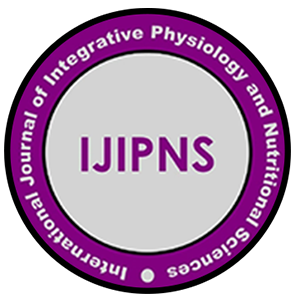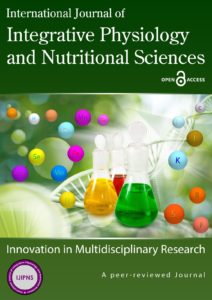INSTRUCTION FOR AUTHORS
Aims and Scope:
The International Journal of Integrative Physiology and Nutritive Sciences (IJIPNS) is a peer-reviewed journal in the field of nutrition and physiology. The journal accepts high-quality research articles, reviews, and short communications in the field of metabolic disorders, complementary and alternative medicines, gut microbiota and its role in maintaining overall health, nutrition, pharmacognosy, pharmaceutics, and phytochemistray. Some of the broad areas of IJIPNS are:
- Experimental studies related to Obesity and associated metabolic disorders such as diabetes, cardiovascular disorders, liver disorders, and gut health
- Mechanism of action of various herbal extracts and natural plants in humans or animal models
- In vitro studies about anti-oxidant and anti-diabetic effects of herbs or pure photochemicals
- New advancements in the field of nutrition and nutraceuticals
- Role of nutraceuticals supplements in the management of various lifestyle-related disorders
- Gut microbes
However, the journal is open to any research which leads to significant advancements in the field of metabolic syndrome, alternative therapies, and lifestyle-related disorders.
Mode of Submission:
IJPNS allows only online submission of research articles, reviews, short commentaries, and letters to editors. For submission of your manuscript please visit (link to the submission portal). Authors must submit their articles in word format with a separate cover page. IJPNS does not follow any particular style of article submission and authors can submit the article in any acceptable format as far as the consistency of writing is maintained. During the submission stage, an article submitted to IJPNS does not need any format and stress will be given to the quality of the content.
Peer-Review Process:
The editorial board can reject articles which do not meet IJPNS standards without review or even reject them once the review is done by a technical expert. Only those articles which will pass the editorial review will be sent to the peer-review process. The decision to reject the articles by the Editorial Board is generally taken in 2 weeks. For manuscripts that are referred to experts for peer-review, a decision will be taken in maximum 30 days and the corresponding author will be informed the outcome of the peer-review process within 30 days. After the peer-review process, one of the following decisions will be taken and communicated to the authors based on the recommendation received from the experts:
- Article rejected
- Article needs minor modifications
- Article needs significant modifications
- Article needs no modifications and accepted in the present format
During the peer-review process, the article will be sent to two experts and a final decision will be taken once the comments from both the reviewers will be received. However, in cases where one of the reviewers is unable to send the comments in the stipulated time-frame, a decision will be taken after considering the comments received from the lone reviewer. In such cases, the decision to accept or reject the article shall be solely based on the recommendation of the lone reviewer and binding. In cases where the reaction is adverse based on the single review, the corresponding author may request a second peer-review by another expert and IJPNS will follow standard time to complete the same.
Article falling in (ii) and (iii) categories will be sent back to the corresponding author (s) with comments obtained during the peer-review process for further action at their end. It is expected that the corresponding author must respond within 2 weeks after making necessary changes and incorporating the changes as requested by the reviewer. IJPNS follows a double-blind peer-review process and the identity of both authors and reviewers will not be revealed at any stage under any circumstances. The final manuscript received after incorporating suggested comments will undergo a final grammar check and published online and all the authors will be intimidated via e-mail upon publication of articles.
Authors must recommend the names of 3 experts in the field from which the article belongs. The Editorial Board may choose 1 reviewer from the suggested list and the other reviewer shall be selected by the Editorial Board. A brief justification (60 words) should be given about the expertise of the suggested reviewers and why they are qualified to review the article. The suggested reviewers should be from a different institute and must not belong to the same institutions. Once the list of suggested reviewers will be received from the corresponding author, the complete review process will be managed by IJPNS and the name of reviewers will be finally revealed at the time of publication.
IJPNS follows a 3-tier peer-review process for all the articles submitted to the journal. In the first step, all the submitted papers will be assigned a unique ID number and immediately referred to the Editorial Board. If the Board member (s) find the article suitable and falling under the aims and scope of the journal, it will be referred to experts for peer-review. After the peer-review process, the editor overseeing the peer-review process will communicate the recommendations of the peer-review process to the Editorial Board. The Editorial Board then makes a final call on acceptance or rejection of the articles. The comments and observations of the peer-review process will be shared with the corresponding author (s) (even if the article has been rejected) to improve the quality of the article. IJPNS does not allow resubmission of rejected manuscripts.
Submission Guidelines:
Submission of papers in IJPNS indicates that papers have not been published or concurrently submitted to any other peer-review journal.It is important to mention that if any part of the paper has been published previously it must be mention with a proper reference. Authors mast take prior permission from other journals and prior publications (books, websites, etc.) to use published data, figures or tables failing which it is considered plagiarism and the corresponding author will be solely responsible for any legal issues that may arise due to such misrepresentation.
Preprint Services:
IJPNS allows the submission to free print service such as aRXiv or bioRXIV and such decisions taken by authors do not affect the editorial decisions.
Authorship:
Authorship must be restricted to researches who have contributed significantly to the work. This includes planning, designing, and executing the experiments. The corresponding author must takes written consent from all the authors mention in the manuscript before submitting the article to IJPNS. The journal will communicate with only one corresponding author during the complete review process and all decisions of peer review will be shared with only one corresponding author.
Individuals who have helped in writing the manuscript may also be mentioned as one of the authors in the paper. The corresponding author should mention the role of each author while submitting the manuscript. At the end of the cover page, all the authors must sign a declaration that they have read and approved the final version of the manuscript.
Authors must mention the specific role in the published work and this information will be published along with the published paper. Some of the categories of contributions are: help in designing the experiment, help in performing experiments, data analysis, writing manuscript, editing manuscript, and optimizing novel method or analytical tools. An author may mention his name in more than one category depending on his/her contribution.
Conflict of interest
it is mandatory to submit a conflict of interest statement in the manuscript and articles which lack this statement will be rejected without any peer- review process. Authors must mention the source of funding, fellowships, or any other specific help received from any government agency or private corporations/companies. All the reviewers must also disclose any association or conflict of interest associated with the submitted manuscript. IJPNS will not refer the article for peer-review to experts who have worked with the corresponding author (s) in any form or collaboration in past 2 years. Other possible conflicts of interest scenarios are advisor during thesis or post-doc and family relationship.
Research Misconduct:
All the research work submitted to IJPNS must be free from any plagiarism, fabrication, and falsification of data, copying of data from other sources, and modification of previous data published by authors from his/her publications. The corresponding author(s) must take the sole responsibility that all the data submitted to IJPNS is free from any research misconduct and utmost research integrity has been followed while acquisition and presentation of the data. IJPNS will check all the submitted manuscripts for plagiarism check using globally reputed plagiarism check software for text duplication.
In cases where quoting a standard definition or source (such as reports published by global agencies like the WHO, ADA, AHA, etc.) becomes necessary to improve the overall message of the research or review article, authors must use quotation marks and provide an adequate reference for the same.
For example: A recent report by the American Diabetic Association reports that “Diabetes remains the 7th leading cause of death in the United States in 2015, with 79,535 death certificates listing it as the underlying cause of death, and a total of 252,806 death certificates listing diabetes as an underlying or contributing cause of death” [1].
However, quoting is allowed in special cases and should not be considered a general norm while writing and submitting the manuscript to IJPNS. Excessive quoting, even with proper reference, in a single article is not allowed and authors are requested to present the findings of global agencies in their own words to reduce the chances of text duplication and subsequent rejection of article due to plagiarism.
In certain cases, IJPNS may request additional information such as raw data, the detailed methodology followed during the experimentation stage, and the description of figure, only if required during the peer-review process. IJPNs will request such additional information from the corresponding author only under special cases and there is no requirement to submit the raw data with the manuscript. However, if authors would like to submit supplementary information, they may submit it as a separate file during the manuscript submission.
Once the manuscript is submitted in a proper format with all declarations, IJPNS understands that all the authors have given their consent to the final manuscript and any supplementary information submitted with the article. If IJPNS receives any grievance from any author anytime during the review process or even after acceptance and publication of the manuscript on the IJPNS website, the corresponding author shall be liable to justify the steps taken by him/her. If an amicable settlement is not reached, IJPNS reserves the right to remove such articles from the website and the concerned institute shall be informed about the author(s) misconduct for further appropriate action at their end.
- Human and animal studies: All the studies involving human and animals mustbe approved by the Institutional Human or Animal Ethics Committees (IHEC/IAEC) and the corresponding approval number provided by the IHEC/IAEC must be provided in the methodology/experimental design section failing which articles will be rejected by the Editorial Board without any peer-review. For human trails or experiments, a declaration by the corresponding author (s) that all the participants have been explained the purpose and any side effects of the study in their mother tongue ( format available here) must be submitted. In cases where ethics approval for involving humans was not necessary, the authors must justify the same. However, the Editorial Board may reject such explanations or justifications and hence the article will automatically get rejected. Authors must submit details of species, strain, sex, and age in case of animal studies. For human trials, authors must follow the guidelines of Declaration of Helsinki.
- Dual use research of concern: Corresponding author must mention if the article presents the findings which come under the dual research of concern category. In such cases, the Editorial Board will take a final call about publishing the article. Such articles may be rejected by the Editorial Board without any peer-review and the decision of the Editorial Board shall be final and without appeal.
- Use of Recombinant DNA: Experiments involving the use of Recombinant DNA in any form must submit an ethical approval from the concerned Institutional Biosafety Committee. The corresponding author must submit the approval number along with the manuscript failing which the article will be rejected by the Editorial Board without any peer review.
- Submission of data to the databases: Authors are encouraged to submit the data to public databases so that it is promptly available for the researchers across the globe and helps in further advancement of science. However, submission of data is at the discretion of the authors and does not affect the peer-review process and the final decision of the Editorial Board. For example, plasmids can be deposited to Addgene. Likewise authors may deposit microarray data, data related with complex protein structures, nucleic acids structures to related standard databases and the accession number must be mentioned in the article. However, in cases where authors are unable to share the data due to privacy or intellectual property concerns, an explanation in this regard may be provided.
- Studies with novel chemical compounds: All the studies involving the use of novel chemical compounds must mention pathways followed to synthesize the novel chemical compound. Authors mast describe the tests performed to confirm the purity of the compound in the materials and methods section. If authors have elucidated the x-ray crystallography structure of the chemical compound, an accession number of database may be provided.
- Statistical analysis: Authors should mention the type and version of the statistical software used in analyzing the research data.
- Figure representation: All the figures presented in the manuscript should be original and duplication from previously published research papers is strictly not allowed. IJPNS allows adjustment of contrast or brightness of the image as for as the adjustments have been made to improve the representation and uniformly applied on all the images. However selective color changes or adjustments in brightness/contrast which changes interpretation of the data are not allowed. Authors should mention in the methodology section if they have changed the contrast or the brightness of any image. Any type of editing in the images, such as inserting or deleting specific portion, to misrepresent the data is not allowed. In cases where the integrity of the images is questioned during the peer-review process the Editorial Board may ask the corresponding author to subject the original unedited images to compare them with the images submitted by the authors in the manuscript. If the corresponding author fails to submit original images within 10 days of such request the article will be rejected. If it is observed during the peer review process that misrepresentation of data was intentional, the same will be reported to the funding agency and the institute.
- Supporting information Any supporting information must be submitted in separate files if necessary. However, the research article must be written in such a way that it stands independently of the supporting information. Supporting Information includes protocols, tables, extra figures, and any other audio or video files that help in better understanding of the experimental design or the overall outcome of the scientific results.
- Open Access: All the articles published in IJPNS are open access and freely available to readers across the globe. Readers can print, circulate, and distribute the published papers without any restrictions. A declaration in this regard must be signed by the corresponding author while submitting the article or within 15 days of submission. No submission and publication charges are applicable and the articles are published free of charge.
- Errata: Any errors in the article such as representation errors, wrong referencing, or any other genuine error must be brought into the notice of the Editorial Board as soon as the corresponding authors become aware of it. IJPNS will publish separate Errata for such articles. The corresponding author can also retract the article and the same will be published on the IJPNS website page.


